19 September
1551 – Birth of Henry III of France. He was born at the Château de Fontainebleau, and was the fourth son of King Henry II and Catherine de' Medici. He was King of France from 1574 to 1589, succeeding his brother, Charles IX.
1555 – Burnings of Protestant martyrs, Robert Glover and Cornelius Bungey, at Coventry. John Foxe gives the date of their burnings as “about the 20th day” in his “Actes and Monuments” (1563), but Rev. Thomas Brice gives the date as the 19th in his “A Compendious Regester” of 1559. Foxe actually used Brice's “Regester” as a source.
1560 – Baptism of Thomas Cavendish, explorer, navigator and privateer, at St Martin's Church, Trimley St Martin, Suffolk. Cavendish is known for his imitation of Sir Francis Drake's circumnavigation of the globe, which he undertook in 1586, and for being the first Englishman to explore the island of St Helena, in the mid-Atlantic.
1580 - Death of Katherine Bertie (née Willoughby and previous married name Brandon) after a long illness. She was buried in Spilsby church, Lincolnshire. Click here to read more about her.
20 September
1486 - Birth of Arthur, Prince of Wales, son of Henry VII and Elizabeth of York, at Winchester. Click here to read more about Arthur.
1554 – Death of Sir William Paston, courtier and landowner, at Paston. He was buried there. Paston served Henry VIII as a Sheriff and Commissioner, and was also chosen to welcome Anne of Cleves to court in January 1540.
1586 – Executions of Anthony Babington, John Ballard, John Savage, Chidiock Tichborne and three other conspirators near St Giles-in-the-Fields in London. They were hanged, drawn and quartered for plotting to assassinate Queen Elizabeth I in the famous Babington Plot in support of Mary, Queen of Scots. A further seven were executed the following day.
1596 – Death of William Day, Bishop of Winchester.
21 September
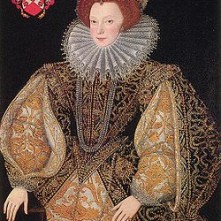 1550 – Death of William Rugg (Repps), Bishop of Norwich. He was buried at the cathedral there. Rugg supported Henry VIII's quest for an annulment of his marriage to Catherine of Aragon and his subsequent supremacy, but his conservativism in other areas caused conflict between him, Thomas Cromwell and Thomas Cranmer. Rugg resigned his episcopate in January 1550 in return for pardons for his alleged support of the rebels in Kett's Rebellion.
1550 – Death of William Rugg (Repps), Bishop of Norwich. He was buried at the cathedral there. Rugg supported Henry VIII's quest for an annulment of his marriage to Catherine of Aragon and his subsequent supremacy, but his conservativism in other areas caused conflict between him, Thomas Cromwell and Thomas Cranmer. Rugg resigned his episcopate in January 1550 in return for pardons for his alleged support of the rebels in Kett's Rebellion.
1557 – Burial of Henry Pendleton, theologian, chaplain and friend of Bishop Bonner, at St Stephen Walbrook, London. Pendleton is known for his changing religious beliefs: he was against Lutheranism in Henry VIII's reign, supported Protestantism in Edward VI's reign and then converted back to Catholicism in Mary I's reign.
1558 - Death of Charles V, former Holy Roman Emperor, from malaria at the monastery of Yuste in the Extremadura region of Spain. He had previously been suffering from debilitating attacks of gout which had necessitated him being carried around in a chair. Charles was buried at the monastery church, but later moved to the Royal Pantheon of El Escorial, the Royal Palace at San Lorenzo de El Escorial near Madrid.
1578 - Marriage of Robert Dudley, Earl of Leicester, and Lettice Devereux (née Knollys) widow of Walter Devereux, Earl of Essex, at Leicester's house in Wanstead, Essex. The marriage was low-key because Leicester had not told Elizabeth I of his relationship with Lettice.
1579 – Burial of Sir Edward Fitton, president of Connacht and Thomond, Vice-Treasurer and Treasurer-at-Wars during Elizabeth I's reign. He was buried beside his wife, Anne, at St Patrick's Cathedral in Dublin, Ireland.
22 September
1515 - Anna von Jülich-Kleve-Berg, or Anne of Cleves, was born near Düsseldorf. She was the second daughter of John III, Duke of Jülich, Cleves and Berg, an important German ruler, and Maria of Jülich-Berg. Anne had royal blood; not only was she descended from Edward I, she was also, on her father's side, closely related to Louis XII of France and the Duke of Burgundy. Anne was Henry VIII's fourth wife. Click here to see our Anne of Cleves archive.
1544 – Death of James Nedeham, architect, while accompanying King Henry VIII to Boulogne. He was buried in Boulogne at the church of Our Lady, and a monument was erected to him at the church in Little Wymondley, Hertfordshire. Nedeham worked for Cardinal Wolsey on York Place, and then for the King on Hampton Court Palace, the Jewel House at the Tower of London and St Augustine's in Canterbury.
1557 – Death of Robert Steward, Prior and Dean of Ely, at Ely. He was buried in Ely Cathedral.
1557 – Death of Robert Warton, Bishop of Hereford. He was buried in Hereford Cathedral, in the north-east transept.
1560 – Burial of Amy Dudley (née Robsart), wife of Robert Dudley, Earl of Leicester, at St Mary's, Oxford.
1610 – Burial of Puritan politician and author Sir Francis Hastings at North Cadbury Church in Somerset, next to his wife. Hastings was a member of Parliament and Sheriff in Leicestershire during Elizabeth I's reign, and is known for his Puritan pamphlets, which included “A Watch-Word to All Religious, and True Hearted English-Men”.
23 September
1568 – Battle of San Juan de Ulúa, near present day Veracruz, Mexico, between Spanish forces and English privateers led by John Hawkins. The Spanish forces were victorious.
1571 - Forty-nine year-old Bishop of Salisbury, Bishop John Jewel, died at Monkton Farleigh Manor after being taken ill while preaching a sermon in Lac*ck. He was laid to rest in Salisbury Cathedral.
1605 – Burial of William Averell, pamphleteer, at St Peter's Cornhill. Averill's works included the romantic “An excellent historie, both pithy and pleasant, on the life and death of Charles and Julia, two Brittish, or rather Welsh lovers” (1581), the Protestant “A wonderfull and straunge newes, which happened in the county of Suffolke, and Essex, the first of February, being Friday, where in rayned wheat, the space of vi or vii miles compass” (1583), a collection of moral narrative “A Dyall for Dainty Darlings” (1584) and “A Mervalious Combat of Contrarieties” (1588).
24 September
1486 - Arthur, Prince of Wales and son of Henry VII, was christened at a lavish ceremony at Winchester Cathedral.
1516 – Birth of Richard Pate, lawyer, member of Parliament and refounder of Cheltenham Grammar School, now known as Pate's Grammar School.
1526 – Sometime before 24th September 1526, Marmaduke Huby, Abbot of Fountains since 1495, died at around the age of 87. It is thought that he was buried under the floor of the chapter house.
1561 – Birth of Edward Seymour, Viscount Beauchamp, son of Katherine Grey (sister of Lady Jane Grey) and Edward Seymour, 1st Earl of Hertford, in the Tower of London. He was born in the Tower because his parents had been imprisoned for marrying without the Queen's permission.
1589 – Executions of William Spenser, Roman Catholic priest and martyr, and layman Robert Hardesty at York. Spenser was executed for being a priest, and Hardesty for sheltering Spenser.
25 September
1513 - Vasco Núñez de Balboa, the Spanish explorer, reached the Pacific Ocean. He was the first European to have discovered the Pacific Ocean from the New World.
1525 - Explorer, navigator and naval administrator Stephen Borough (Burrough) was born at Borough House, Northam Burrows, Northam in Devon, to Walter Borough and his wife Mary Dough.
1534 – Death of Pope Clement VII in Rome from eating a death cap mushroom. He was laid to rest in Santa Maria sopra Minerva.
1554 – Death of Richard Sampson, Bishop of Coventry and Lichfield, and former President of the Council of the Welsh Marches, at Eccleshall in Staffordshire. He was buried in the parish church at Eccleshall. Sampson had acted as the King's Proctor at the fall of Anne Boleyn in 1536.
1555 – The Peace of Augsburg, or Augsburg Settlement, was signed by Charles V, Holy Roman Emperor, and the princes of the Schmalkaldic League at Augsburg.
1558 – Gertrude Courtenay, Marchioness of Exeter, made her will. She died soon after and was buried in Wimborne Minster, Dorset. Gertrude was the mother of Edward Courtenay, 1st Earl of Devon, who was imprisoned for his part in Wyatt's Rebellion in 1554. Gertude, herself, was imprisoned in 1538, and her husband was executed for treason.
1584 – Death of Thomas Copley, Roman Catholic, in exile near Antwerp. He had served Elizabeth I as Commissioner of the Peace for Surrey, and she was godmother to his son, Henry, but he lost royal favour when he converted to Catholicism in 1563. He left England in 1570, being unable to accept royal supremacy and Elizabeth I's religious measures.
1586 – Mary, Queen of Scots was moved to Fotheringhay Castle in Northamptonshire, and Elizabeth finally backed down and agreed to the appointing of 36 commissioners to act as judges in her trial.
1594 – Death of Gregory Fiennes, 10th Baron Dacre, at Chelsea. He was buried in Chelsea Old Church.
1602 – Death of William Redman, Bishop of Norwich, at the Episcopal Palace. He was buried in the cathedral choir.

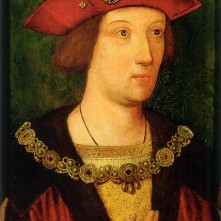



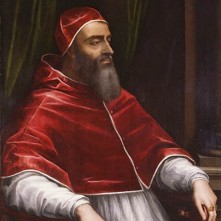
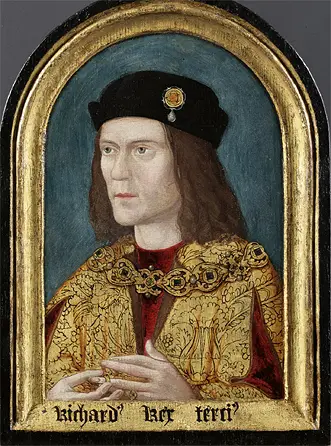
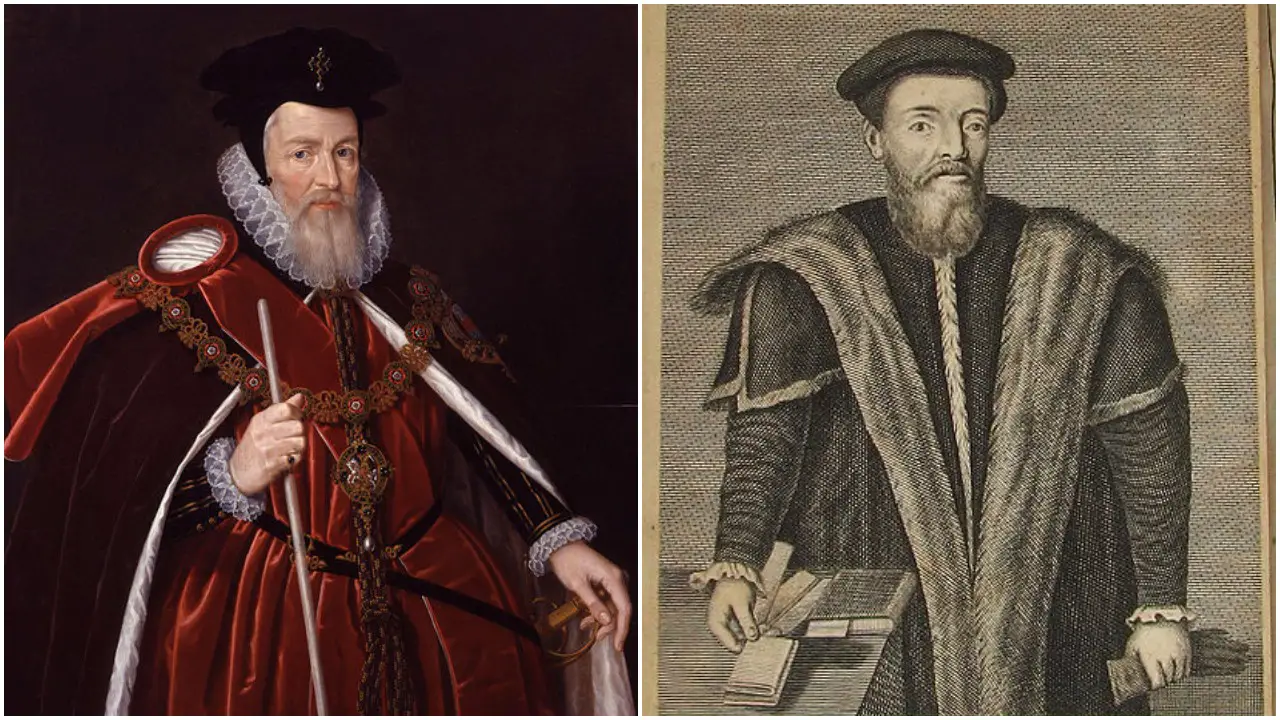
Leave a Reply